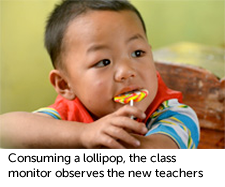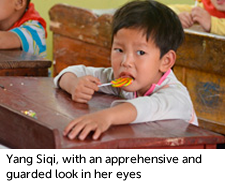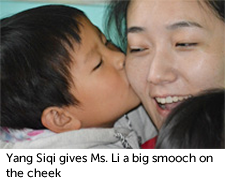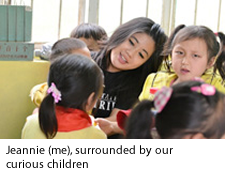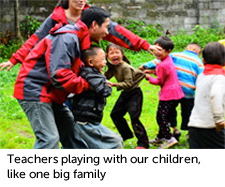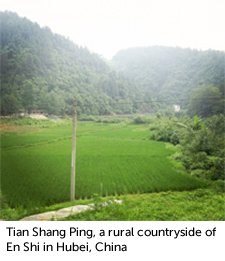by Jeannie Chen

I see the world differently from most other people. My camera is my third eye; its lens provides a spectrum of windows to the world. Photographs are my personal method of capturing the present and preserving the past. Through my camera's eye, I discovered a different side of China: the rural countryside of En Shi in Hubei. No skyscrapers or blaring city lights can be found here. Only a gentle quietness, like soft fog, pervades the rice paddies, dirt paths, and the industrious people inhabiting this mountainous region known as Tian Shang Ping. Colors take on different shades. Time passes to its own singular rhythm. The children walk through fields of green to attend school every day, and on the morning of Monday, June 29th at 8: 00 a.m., our team of four teachers drove up a winding and perilous mountain road and arrived at a small, antiquated schoolhouse to teach these children.
I vividly remember the first day. Most notable was the classroom itself. Its walls were bare and the school desks were dilapidated and heavily scratched. Save for some floral decorations and a lone chalkboard, the small, suffocating, and prison-like classroom stood in stark contrast to the clean, expansive classrooms of urban city schools that many privileged children take for granted. One by one, the children filtered into the classroom with wide-eyed expressions. They numbered 15 in total. The youngest was barely 4 years old; the oldest, 8 years old. The children eyed our red jackets, new-fangled technological devices, and supply boxes with bright-eyed curiosity and guarded apprehension. I knew what they were wondering. I knew what they were feeling. I knew they were thinking, 'Who were these people?' because I had already gotten into position and was there in every corner, capturing their every movement. My lens disclosed their ponderous expressions, wide open eyes and revealing body language, and translated their behavior into multifaceted, intricate emotions, similar to how a musician interprets music or a deaf person reads lips. Some were openly curious, while others had lowered their eyes and were shyly observing us from beneath their lashes. Still others were already fidgeting out of their seats, barely able to contain their excitement. These multifarious personalities were already revealing themselves through my camera's eye. I smiled.
We were scheduled to start class at 8:30 a.m. sharp. Taking a cursory look at the small, dust-covered wall clock, I perceived the time to be 9:00 a.m. already. It was still quite some time before we were ready to start the first lesson. Mrs. Xiong started off the day teaching grammar by reading a story to the children. Next was math with Ms. Li (or Sunny). Afterwards were art, origami, and paper cutting with Mr. Wan. While the other teachers slowly and patiently shared their knowledge with the children, I quickly found my little niche by quietly snapping pictures, catching the best and sweetest moments when the children were in their most natural state. The best pictures were those that capture the least expected moments at the least expected times. Posed pictures were mediocre at best, and trying to coerce the children to look into my lens somehow lessened the honesty and genuine emotion of the moment. At times when my camera was not ready or fast enough, I could whip my phone out and snap wide-angle shots.
As the days progressed, we became gradually familiar with the children. We learned their names, became acquainted with their various and colorful personalities, and before we knew what had happened, a family was born. Step by step, photograph after photograph, I witnessed and recorded the hesitant first strides and the resulting maturation of the relationship between teachers and children. Like watching a field of flowers blooming to full glory and potential, I saw faces crack open in laughter. Genuine happiness pervaded the classroom and overflowed from open windows. Something good was happening every day and smiles gradually became a common sight. To see the children's faces light up at the sight of our approaching car was a joy in itself. Upon entering the classroom, I would almost always find myself covered head to toe in giggling children. When a child became injured, Ms. Li or Mrs. Xiong would apply healing medicine to their wounds. When a child cried, I would sling my camera back on my shoulder and kneel down with open arms to offer comfort. When a child had dirty face and hands, we washed both using a washcloth and soap water. What a child was lacking, we strove to provide. Many of these children's parents lived and worked in faraway cities, regularly sending money home to support their families. Grandparents took care of their grandchildren. Though they provided food, love, and shelter, they could not provide what a mother and father could. As a result, a void existed in the family unit; we filled this void with as much warmth, food, and love as we could manage in five days.
We had only five days, but it was miraculous what we accomplished. In five days, we set up a functioning kitchen and dining room, and connected electricity to the first floor. The single light bulb illuminated this one-room school house and allowed the children to feel welcome during dark, overcast days. Every day, teachers and children ate good food, thanks to the fine culinary prowess of Mr. Wan. Every day, we piled back into our pickup truck and headed back down the mountain, sometimes feeling tired, sometimes feeling like we were barely able to take another step forward, but also feeling proud of what we accomplished each day. The promise of what we could accomplish was what motivated us to keep moving forward, to keep the fire of hope burning for these children whom we now called our own.
When the last day happened upon us, we left quietly, not wanting to make a big scene. It all felt too soon. With heavy hearts, we traveled down the same worn and beaten path, down the mountain for the last time. For all the joy and love we brought, even if we felt that not enough was done to help and change the lives of the children on the mountain, we would leave our hearts and handprints forever with those of the children. Some cried, but I smiled. People might think my reaction strange, but I can tell them for a fact that we were not leaving the children behind, but walking ever more forward with these children, hand in hand. Little by little, like drops of water, the small things that we have done and others will do for those children will eventually accumulate and become a roaring ocean. There will be more teachers who will visit En Shi's Tian Shang Ping. There will be more and different kinds of love coming the way of the children of Tian Shang Ping. It will never end. It will not stop at Tian Shang Ping.
I am honored to have been chosen for this trip as a foreign guest. Some of my best photographic works and most treasured memories were produced during this one week at Tian Shang Ping. I will take away not only the physical photographs, but also the spirit and emotions of the children on the mountain. I can still remember each and every name, I can still see each and every face, and I can still hear each and every voice. They will stay with me forever.



